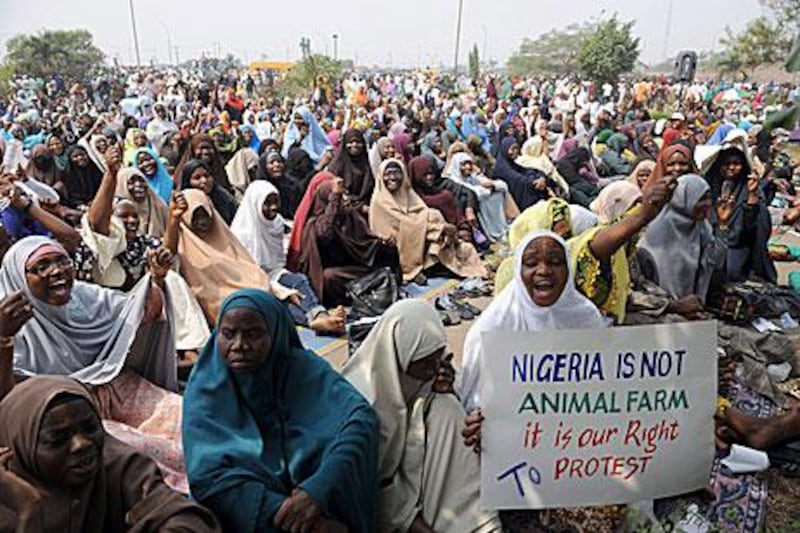LAGOS // "Nigeria is not Animal Farm" read one placard brandished during days of furious fuel price protests by Nigerians which have combined with a violent Islamist insurgency to move Africa's top oil producer closer to what many fear may be a breaking point.
The same political vices of corrupt leadership and abuse of power which George Orwell skewered in his 1945 novella Animal Farm have corroded Nigeria's politics since independence from Britain in 1960. Angry popular backlash against these is fuelling the latest violence.
This anti-establishment fury brought Africa's second-largest economy to a standstill last week. Citizens from all walks of life have taken to the streets after President Goodluck Jonathan's government announced on January 1 it would scrap a petrol subsidy, more than doubling fuel prices.
Public rage has erupted at the same time that a spate of bombings and shootings by a shadowy Islamist sect is threatening to fracture the country's sensitive north-south, Muslim-Christian divide. This religious fault line has caused sectarian conflict claiming thousands of lives in the past.
Some are now asking whether this dynamic but troubled country of 160 million, carved by colonial rulers out of a jigsaw of ethnic and religious groups, can still hold together or risks plunging again into all-out conflict and even break up.
Many still remember the divisive 1967-1970 civil war over secessionist Biafra that killed more than a million people and caused mass starvation, dislocation and suffering.
"As the ripples of incessant bombings and massacres resonate ... fear, anger and hatred have been woven into the very fabric of the nation's life," Soni Daniel, the deputy editor of Nigerian daily Leadership wrote in an editorial on Saturday.
"Nigeria has never come as close to the brink of civil war."
The nationwide fuel protests have become an outlet for thousands to vent their grievances against what they see as a venal ruling political class and incompetent government, which is struggling to tackle an insurgency by the Boko Haram Islamist sect based in the largely Muslim north.
"The bottom line is we don't trust the government to do what they say anymore," said Remi Sonaiya, a student in Lagos, while protesters thrashed an effigy of Mr Jonathan across the face with leafy branches.
Unions launched strikes against the fuel subsidy removal and these are estimated to be costing the country US$600 million (Dh2.2 billon) a day. They have also threatened to shut down Nigeria's 2 million barrel-per-day oil industry, rattling global energy markets.
Jennifer Giroux, senior researcher for the Centre for Security Studies (CSS) at ETH Zurich University, said the fuel-prices issue is "a common rallying point ... A unifying issue that has had an immediate effect on the majority of Nigerians, most of whom are making $2 a day or less".
Attacks have continued during the fuel protests. Targeting of minority Christians triggered reprisals by Christians on Muslims in the south, even though the majority of the two communities have shown in the past they can live in peace.
Fears that violence could degenerate into something even bigger seem to be gaining some traction.
In a recent interview with the BBC, Nobel Prize-winning Nigerian author Wole Soyinka said the comparison with the traumatic Biafra war was "not unrealistic".
"We see the nation heading towards a civil war, we know that the (Biafra) civil war was preceded by serious killings by both sides of the regional divide, we've seen reprisals," he said. "It is going that way, we no longer can pretend it's not. When you get a situation where a bunch of people can go into a place of worship and open fire through the windows, you've reached a certain dismal watershed."
Some question whether Mr Jonathan, who as vice president first took power in May 2010 when his predecessor Umaru Yar'Adua died, has the capacity to lead Nigeria out of its multi-headed crisis.
They worry that his miscalculation of the public mood over the fuel subsidy removal, and his slow reaction to the escalating Boko Haram insurgency suggest he may struggle.
"There are serious questions about how in control the president is, with some really poor decision making. Is Goodluck Jonathan really able to provide visionary leadership?" asked Alex Vines, a senior fellow and Africa specialist at London think tank Chatham House.
"There seems to be just drift and indecisiveness."
Last year, Boko Haram attacks spread and hit the capital, Abuja, yet Mr Jonathan's reaction has often appeared low key. Some critics have faulted him for initially treating the insurgency as a purely security issue, rather than as something requiring a political settlement.
"He's eerily calm considering we could be weeks away from a major confrontation," said the Africa Confidential editor Patrick Smith. "The absolute failure ... to wheel on southerners and northerners at the same time to say this is a national crisis and we have to pull together, is striking."
The biggest fear, Mr Smith said, is that the army - whose upper ranks are all southern Christians, while junior officers and lower ranks are a mix of both from many geographical locations - could fracture if a section of it launches a mutiny.
There are already rumblings in the military, he said.
"The next big fault line is the army, and how well they stay together ... If it splits, that is this country's nightmare."





